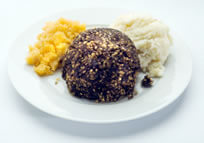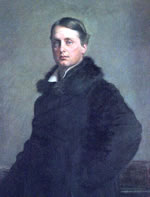Governments and beverage makes are locked in battle over sugary drinks
【春小饌之一:歐芹膨鬆餅(parsley popover)】
「從緬因州來的拓荒者,在奧瑞岡建立了波特蘭,也把約克夏鬆餅(Yorkshire pudding)美國化了。他們把烤牛肉(有時是豬肉)的滴油抹在烤杯中,再倒入麵糊。另一個改良是加了大蒜,也常用調味香草。這就成了波特蘭膨鬆餅(Portland popover pudding),一個個帶肉香,氣球似的脆皮糕點。」
-----------Evan Jones《American Food: the Gastronomic Story》
-----------Evan Jones《American Food: the Gastronomic Story》
Parsley,音譯叫巴西利,意譯叫歐芹,香港叫番茜,雖然它其實比較接近芹菜。
我冬天種下的幾棵,入春長勢旺盛,一綹綹蜷曲綠葉,小波浪捲髮似的,枝叢蓬蓬然如大花束。現在最好吃,質地生嫩,氣味淡雅,像芫荽揉著草芽的清香,等到初夏枝葉老韌,就會有股木頭味。
今早摘了一籃,做了沙拉和義大利麵後,還剩一大把,於是烤了這小餅。Popover是美國版的Yorkshire pudding(這個pudding不是布丁,是麵餅),像馬芬鬆餅,但更輕盈柔軟,喝下午茶配這個,春味綠香,盡入心脾。
By MICHAEL M. GRYNBAUM 6 minutes ago
A proposal that would take effect as soon as next March is the most ambitious effort yet by Mayor Michael R. Bloomberg’s administration to combat rising obesity.
McDonald’s farmyard ads draw fire
Pronunciation: /ˈpʊdɪŋ/
Definition of pudding in English:
noun
chiefly BritishOrigin
Middle English (denoting a sausage such as black pudding): apparently from Old French boudin 'black pudding', from Latin botellus 'sausage, small intestine'.
The proof of the pudding
MeaningTo fully test something you need to experience it yourself.
Origin
'The proof of the pudding' is just shorthand for 'the proof of the pudding is in the eating'. That makes sense at least, whereas the shortened version really doesn't mean anything. Nor does the often-quoted incorrect variation 'the proof is in the pudding'. The continued use of that meaningless version is no doubt bolstered by the fact that the correct version isn't that easy to understand.
The meaning become clear when you know that 'proof' here means 'test'. The more common meaning of proof in our day and age is 'the evidence that demonstrates a truth' - as in a mathematical or legal proof. The verb form meaning 'to test' is less often used these days, although it does survive in several commonly used phrases: 'the exception that proves the rule', 'proof-read', 'proving-ground', etc. Clearly, the distinction between these two forms of the word was originally quite slight and the proof in a 'showing to be true' sense is merely the successful outcome of a test of whether a proposition is correct or not.
'The proof of the pudding is in the eating' is a very old proverb. The Oxford Dictionary of Quotations dates it back to the early 14th century, albeit without offering any supporting evidence. The phrase is widely attributed to Cervantes in The History of Don Quixote. This appears to be by virtue of an early 18th century translation by Peter Motteux, which has been criticised by later scholars as 'a loose paraphrase' and 'Franco-Cockney'. Crucially the Spanish word for pudding - 'budín', doesn't appear in the original Spanish text.
The earliest printed example of the proverb that I can find is in William Camden's Remaines of a Greater Worke Concerning Britaine, 1605:
"All the proof of a pudding is in the eating."
 It is worth remembering that, as the phrase is quite old, the pudding wouldn't have been a sticky toffee pudding from the sweet trolley, but a potentially fatal savoury dish. In Camden's listing of proverbs he also includes "If you eat a pudding at home, the dog may have the skin", which suggests that the pudding he had in mind was some form of sausage. THE OED describes the mediaeval pudding as 'the stomach or one of the entrails of a pig, sheep, or other animal, stuffed with a mixture of minced meat, suet, oatmeal, seasoning, etc., and boiled'. Those of you who have ventured north of the border on Burns Night will recognize this as a fair description of a haggis - "the great chieftain o' the pudding-race", as Burns called it in the poem Address to a Haggis, 1786. Mediaeval peasants, faced with a boiled up farmyard massacre, might have thought a taste test to have been a wise choice.
It is worth remembering that, as the phrase is quite old, the pudding wouldn't have been a sticky toffee pudding from the sweet trolley, but a potentially fatal savoury dish. In Camden's listing of proverbs he also includes "If you eat a pudding at home, the dog may have the skin", which suggests that the pudding he had in mind was some form of sausage. THE OED describes the mediaeval pudding as 'the stomach or one of the entrails of a pig, sheep, or other animal, stuffed with a mixture of minced meat, suet, oatmeal, seasoning, etc., and boiled'. Those of you who have ventured north of the border on Burns Night will recognize this as a fair description of a haggis - "the great chieftain o' the pudding-race", as Burns called it in the poem Address to a Haggis, 1786. Mediaeval peasants, faced with a boiled up farmyard massacre, might have thought a taste test to have been a wise choice. See also: the List of Proverbs.
The Phrase A Week newsletter goes to 84,000 subscribers (65,500 by e-mail, 18,500 by RSS feed).
A Birmingham Post article by Chris Upton compares “The Tripe Eaters,” one of Freeth’s works, to Robert Burns’ “Address to a Haggis.” It begins “Of all the towns in England/ For tripe that’s fat and fair,/ There’s not one, I trow, that can/ With Birmingham compare,” and then launches into the “And a-triping we will go” refrain.
席哈克又提到前北大西洋公約組織秘書長羅伯森(George Robertson)曾請他品嘗「令人反胃的蘇格蘭菜」羊肉雜碎布丁(Haggis),他坦言:「這便是我們和北約麻煩的根源」,惹得普丁和施洛德大笑。普丁後來問:「那(英國的)漢堡又如何?」席哈克說:「不!不!漢堡根本不值一瞧。」。
A Birmingham Post article by Chris Upton compares “The Tripe Eaters,” one of Freeth’s works, to Robert Burns’ “Address to a Haggis.” It begins “Of all the towns in England/ For tripe that’s fat and fair,/ There’s not one, I trow, that can/ With Birmingham compare,” and then launches into the “And a-triping we will go” refrain.
席哈克又提到前北大西洋公約組織秘書長羅伯森(George Robertson)曾請他品嘗「令人反胃的蘇格蘭菜」羊肉雜碎布丁(Haggis),他坦言:「這便是我們和北約麻煩的根源」,惹得普丁和施洛德大笑。普丁後來問:「那(英國的)漢堡又如何?」席哈克說:「不!不!漢堡根本不值一瞧。」。
Toffee-nosed
MeaningSnobbish; supercilious; stuck-up.
Origin
Judging by the queries at my website's Bulletin Board, the British expression 'toffee-nosed' isn't familiar to everyone in the English-speaking world. Whenever it crops up in a BBC drama that is shown in the USA I get mail about it. For those not familiar with it, the meaning is somewhat similar to 'posh'.
The origin of 'toffee-nosed' has nothing to do with the sugary, brown sweet, but derives from 'toff', which was the slang term given by the lower-classes in Victorian England to stylishly-dressed upper-class gentlemen. It was recorded by Henry Mayhew in London Labour and the London Poor, 1851:
If it's a lady and gentleman, then we cries, 'A toff and a doll!'
 It is widely agreed amongst etymologists that 'toff' was a corruption of 'tuft', which has a clear aristocratic pedigree, being the ornamental tassel on an academic cap. Specifically, a tuft was the gold tassel originally worn on academic caps at Oxford University by the sons of those peers who had a vote in the House of Lords. They were worn on the celebratory 'Gaudy Days', i.e. the university's twice-yearly feast days (which sound a good deal more fun than 'Dress-down Fridays'). The wearers of the prestigious tufts became known as tufts themselves, even having their own sycophantic crowd of wannabees, known as the 'tufthunters'.
It is widely agreed amongst etymologists that 'toff' was a corruption of 'tuft', which has a clear aristocratic pedigree, being the ornamental tassel on an academic cap. Specifically, a tuft was the gold tassel originally worn on academic caps at Oxford University by the sons of those peers who had a vote in the House of Lords. They were worn on the celebratory 'Gaudy Days', i.e. the university's twice-yearly feast days (which sound a good deal more fun than 'Dress-down Fridays'). The wearers of the prestigious tufts became known as tufts themselves, even having their own sycophantic crowd of wannabees, known as the 'tufthunters'.  If ever there was a tuft, it was the well-connected student Archibald Philip Primrose, the fifth Earl of Rosebery, first Earl of Midlothian and later British Prime Minister. In March 1894, The Westmoreland Gazette reported that:
If ever there was a tuft, it was the well-connected student Archibald Philip Primrose, the fifth Earl of Rosebery, first Earl of Midlothian and later British Prime Minister. In March 1894, The Westmoreland Gazette reported that:Lord Rosebery was one of the last undergraduates of Christ Church who wore the gold tassel, known by the name of 'tuft', which was the distinguishing mark of noblemen and the sons of noblemen.Tufts were variously called tofts, tuffs and, by 1851 at least, toffs. They were already a well-established breed before 'toffee-nosed' began to be used. That didn't emerge until the early 20th century, as in this definition from Fraser and Gibbons' Soldier and Sailor Words, 1925:
Toffee-nosed, stuck up.'Stuck-up' had emerged a century or so earlier, and is found in Charles Dickens' Nicholas Nickleby, 1839:
'He's a nasty stuck-up monkey, that's what I consider him,' said Mrs. Squeers.The 'nosed' part of 'toffee-nosed' appears to derive from the allusion to the haughty toffs, who stuck their noses in the air when faced with the hoi-polloi.

沒有留言:
張貼留言
注意:只有此網誌的成員可以留言。